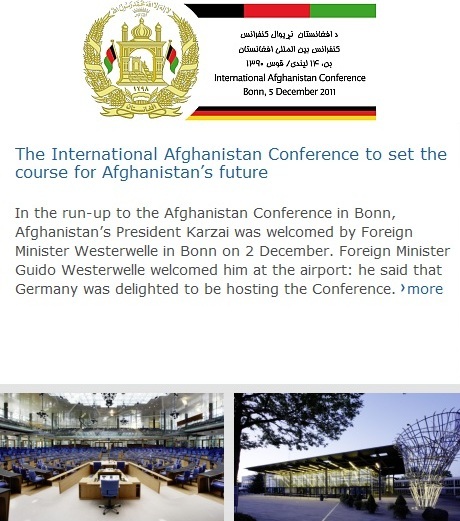
The 2nd Bonn Conference and the Voice of the Marginalised Groups
Petition: To the participants of the 2nd Bonn Conference on Afghanistan
Reading time: (Number of words: )
The first Bonn Conference held on 5th December 2001 was a historic event in the modern history of Afghanistan. The Conference gave hope to the people of Afghanistan, particularly with respect to restoring peace and order, forming a democratic and broad based government, reducing poverty, ending gender, ethnic, religious, and linguistic discrimination, and ending marginalisation and deprivation, which have been the root causes of conflict in Afghanistan over the past decades. Expectations were partially met through the realisation of political milestones, ranging from interim and transitional governments (Dec 2001 & June 2002) to the first and second presidential elections (Oct 2004 & Aug 2009), and the implementation of reconstruction programmes, such as a back-to-school campaign, the promotion of education of girls, and the participation of women in public and social services.
The time between the first and the second Bonn conferences have seen a number of challenges and difficulties. National and international resources have not always been justly and equitably distributed across the country. Certain provinces in the north, west, and south, including the capital city of Kabul, enjoyed the biggest share of national resources and international support. This happened, unfortunately, at the cost of many other provinces, such as those in the southeast (e.g. Nuristan), northeast (e.g. Badakhshan), northwest (e.g. Faryab), the central province of Bamiyan, the central-west province of Ghor, and the central-south province of Daikundi. Despite the fact that provinces, such as Bamiyan, Ghor and Daikundi, have made significant contributions to restoring and sustaining peace and political stability, elimination of poppy cultivation, disarmament of military groups, and supporting democratic means and principles, the people of these provinces continue to be excluded from the mainstream development and reconstruction programmes. As a specific example, although these provinces are rich in natural resources, with suitable agricultural lands, rivers, and historical and cultural sites, one can hardly find proper roads (both paved and unpaved), modern agricultural technology, and the means of obtaining energy and appropriate public health and educational facilities. This shows the depth of marginalisation and deprivation that dominate the life of people in these provinces. It also demonstrates how and why the people of these provinces are relegated to the fringes of society.
The prevention of potential conflicts was an important element in the 2001 Bonn Conference. The conference participants agreed to take every possible measure to prevent a potential ethnic and religious conflict in the future. This was addressed through facilitating political participation of major ethnic groups in accordance with their estimated population sizes. For example, the Hazaras and Uzbeks were considered the third and fourth largest ethnic groups in the country. Therefore, it was envisaged that the Hazaras and Uzbeks should be given a share of 19% and 9% respectively in all political processes. However, the latest figures show that the Uzbeks’ participation in political processes is less than half a percent. In addition, despite the fact that the Hazaras offer more than 10,000 graduates with bachelor’s and master’s degrees from abroad, and comprise more than 30% of higher education student body, their actual participation in political, social and civil services is less than 4%. This shows a significant deviation from the Bonn agreements, underrepresentation of the Hazaras’ and Uzbeks’ participation in political processes, as well as a significant loss of national capacities the Hazara graduates and professionals are able to offer to the political, social, economic, and educational reconstruction and rehabilitation of the country.
The voice of the marginalised people and their call for change must be heard now. At the 2nd Bonn Conference on Afghanistan in December 2011, the international community will discuss the future of Afghanistan. We, the undersigned, stress the importance of fair treatment of all citizens and their equal access to national and international resources, without regard to ethnic, religious, linguistic, and geographic differences. We call on all members of the international community as well as the UN institutions that participate in and endorse the 2nd Bonn Conference to ensure that the rights of marginalised and deprived groups are considered seriously, and that their rights to development programmes and access to economic, educational, and public services are not ignored.

Poems for the Hazara
The Anthology of 125 Internationally Recognized Poets From 68 Countries Dedicated to the Hazara
Order Now








